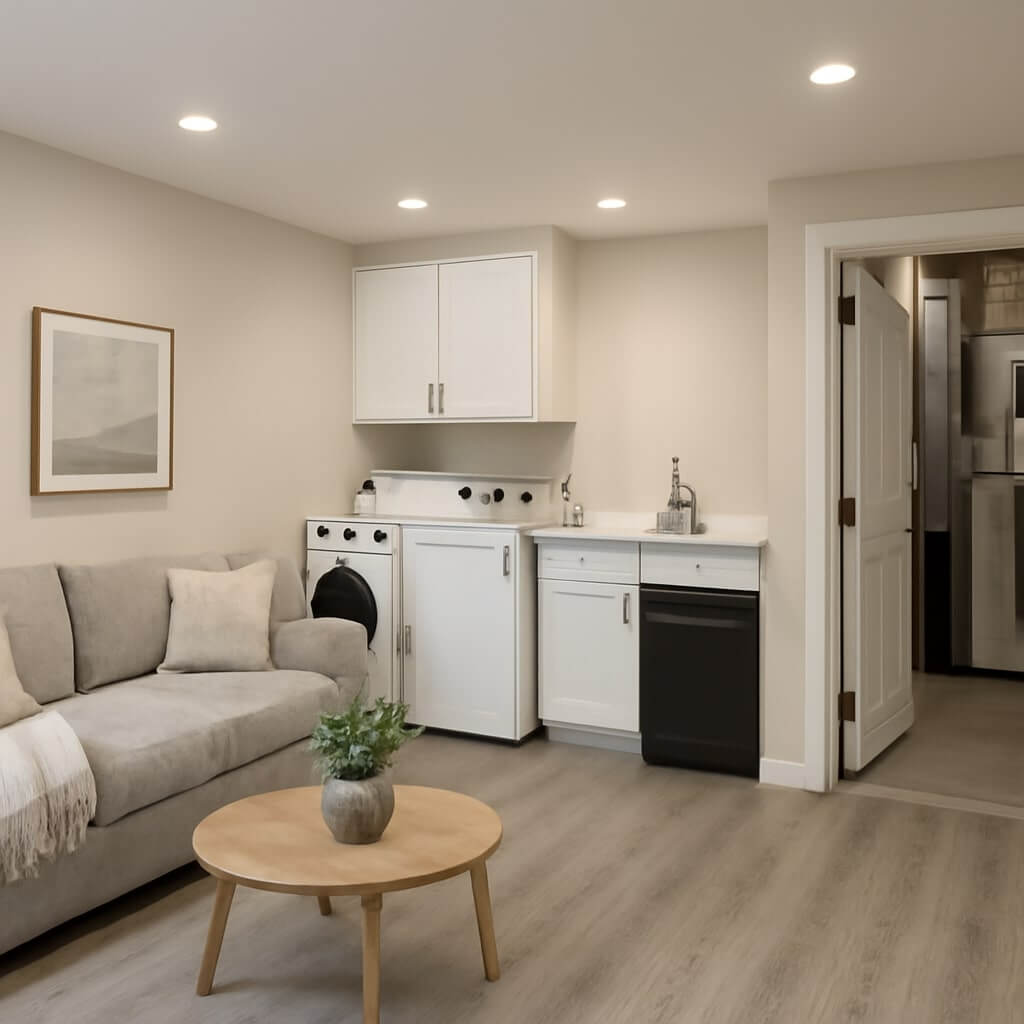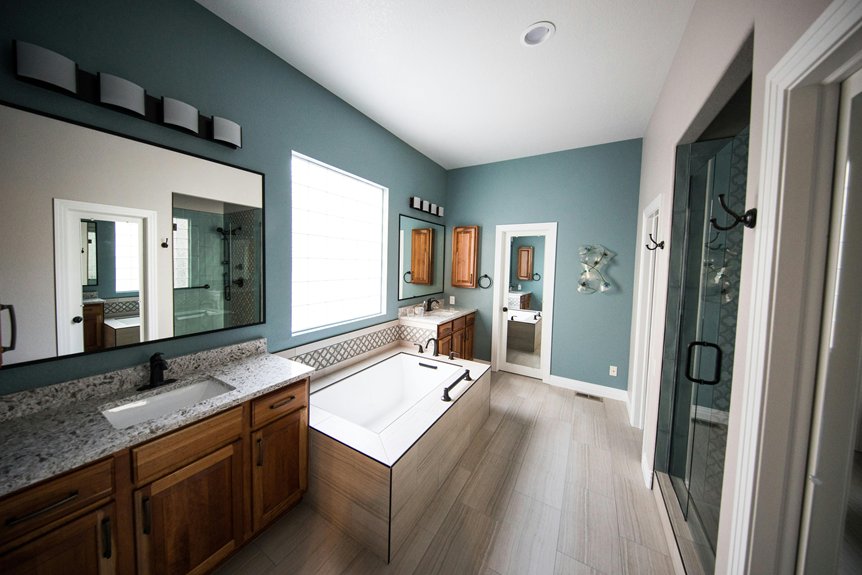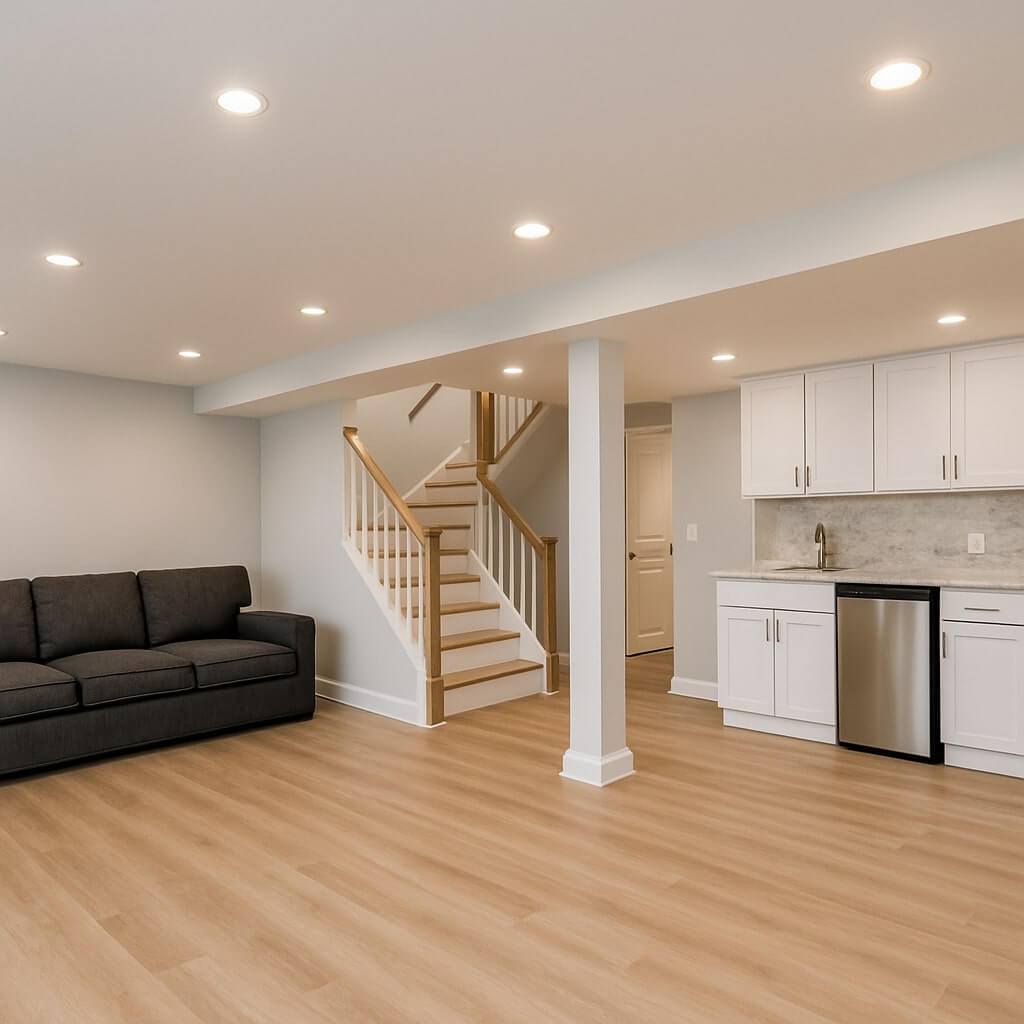When you’re considering a basement remodel, it’s crucial to weigh several key factors that can impact your budget. First, you’ll need to assess your current space and how it aligns with your vision. Then, think about your specific goals for the project. It’s not just about aesthetics; structural integrity and local regulations come into play too. Understanding these elements will set the stage for effective planning. Curious about how to navigate these complexities?
Key Takeaways
- Assessing existing structural integrity and layout can significantly impact remodeling costs and feasibility.
- Defining your goals and needs helps prioritize spending and maximize space utility.
- Choosing high-quality, durable finishing materials can affect overall budget and long-term maintenance.
- Navigating local building codes and permits can add costs and timeline considerations to the remodeling project.
- The complexity of the renovation, including plumbing and electrical work, will influence total remodeling expenses.
Understanding Your Current Space

To kick off your basement remodeling journey, it’s important to grasp the unique characteristics of your current space. Assess the dimensions, ceiling height, and existing features like windows and plumbing. Understanding these elements is vital for effective space utilization.
Consider how the layout impacts functionality; optimizing your floor plan can enhance flow and accessibility. Identify any structural limitations that may influence your design choices.
Defining Your Goals and Needs
What do you envision for your basement? Start by conducting a needs assessment to identify its purpose—whether it’s a cozy family room, a home office, or a rental unit.
Once you’ve outlined your objectives, focus on goal prioritization to make the most of your budget and space. Are you looking for functionality, aesthetics, or both?
Consider how each goal aligns with your lifestyle and future needs. This clarity will guide your design choices and help you avoid costly mistakes.
Evaluating Structural Considerations
While envisioning your ideal basement, it’s essential to review the structural considerations that could impact your remodel.
Start by examining the foundation integrity; any cracks or signs of settling might indicate deeper issues. You’ll want to verify your basement can support the additional weight from renovations, furniture, and occupants.
Examine load distribution as well; improper weight distribution can lead to structural failure. Consult with a professional to analyze these elements thoroughly.
Addressing these concerns before diving into your remodel will save you time and money, guaranteeing a safe and functional space that meets your vision.
Choosing the Right Finishing Options

How do you envision your basement’s final look? Choosing the right finishing options is essential to achieving your desired aesthetic.
Consider various finishing styles, like modern, rustic, or traditional, to set the mood. Each style can greatly influence your material choices. For example, sleek materials like polished concrete or glass can enhance a contemporary vibe, while reclaimed wood or stone can add warmth to a rustic feel.
Don’t forget about durability; selecting high-quality materials guarantees your basement withstands moisture and wear.
Take your time to explore combinations that reflect your personality while being practical for everyday use.
Navigating Building Codes and Permits
Before diving into your basement remodeling project, it’s important to understand the building codes and permits that may apply to your renovations.
Familiarize yourself with local building regulations, as they dictate what’s allowed in your basement. Start by consulting your municipality’s website or visiting the planning office to learn about the permit process.
You might need permits for electrical, plumbing, or structural changes. Make sure you gather all necessary documents and submit them promptly, as delays can hold up your project.
Maneuvering these requirements accurately will save you time and potential fines down the line, so don’t overlook this critical step.
Budgeting for Unexpected Costs
As you plan your basement remodel, it’s crucial to set aside a portion of your budget for unexpected costs that may arise during the project.
Effective contingency planning can save you from financial stress down the road. Consider allocating 10-20% of your total budget as an emergency fund to cover unforeseen issues, such as plumbing problems or structural repairs.
This buffer will give you peace of mind, allowing you to focus on your vision without constant worry. By being proactive about potential expenses, you’ll make certain your basement remodel stays on track, both financially and creatively.
Hiring the Right Professionals

When it comes to hiring professionals for your basement remodel, evaluating their experience and skills is essential.
You’ll want to guarantee they’ve a proven track record and relevant expertise to bring your vision to life.
Additionally, reviewing the cost and value of their services will help you make an informed decision that fits your budget.
Assessing Experience and Skills
Hiring the right professionals for your basement remodeling project can greatly impact the outcome and efficiency of the work. Assess their experience and skills to verify they align with your vision.
Consider these key factors:
- Remodeling Expertise: Look for a contractor with a solid portfolio and references.
- DIY Skills: If you’re planning to do some work yourself, find professionals who can collaborate effectively with your DIY efforts.
- Communication: Choose someone who listens to your ideas and communicates clearly throughout the project.
This careful assessment will lead to a smoother remodeling experience and a stunning final result.
Evaluating Cost and Value
While you may be tempted to choose the lowest bid for your basement remodeling project, it’s essential to evaluate the cost in relation to the value you’ll receive.
Conduct a thorough cost analysis, considering materials, labor, and potential hidden expenses. Hiring professionals with a proven track record can greatly impact your project’s quality and longevity.
Remember, the cheapest option mightn’t provide the best return on investment. Instead, focus on the expertise, reliability, and past work of your contractors.
Balancing cost with value guarantees your remodeled basement meets your needs and enhances your home’s overall worth.
Conclusion
In summary, remodeling your basement is a multifaceted process that requires careful consideration of various factors. By understanding your current space and defining your goals, you can create a practical plan. Don’t overlook structural integrity and local building codes, as these can impact your budget. Choosing the right finishes and preparing for unexpected costs will guarantee a smoother project. Finally, enlisting experienced professionals can make all the difference, helping you achieve a successful and satisfying remodel.




